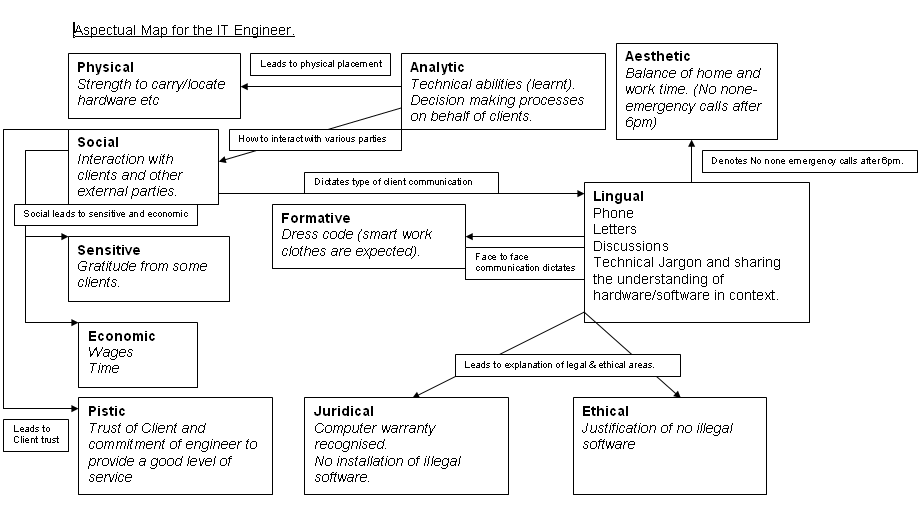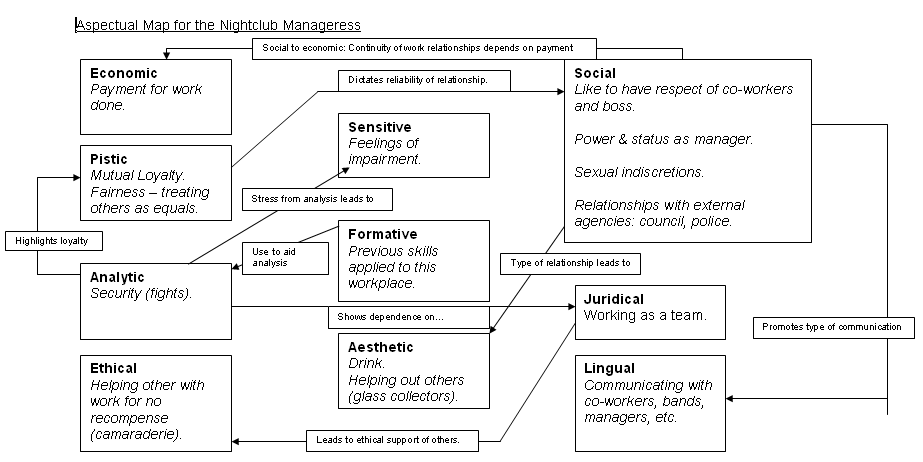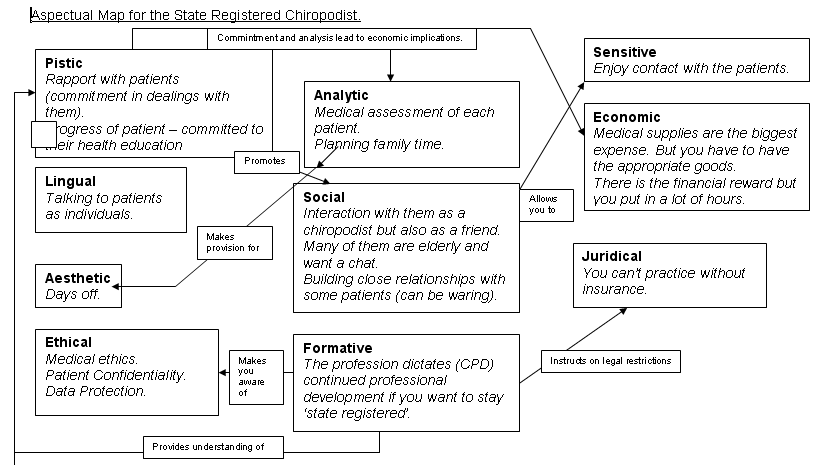
MAKE (Multi-Aspectual Knowledge Elicitation) is a method for analysing someone's knowledge to obtain a rich picture in which all relevant aspects are made explicit. That is, to explicate all that is meaningful to the person. MAKE is particularly useful for explicating tacit knowledge, or rather knowledge that is taken for granted.
In the following section three interviews carried out in order to test the MAKE interview method and just as importantly to allow a learning environment for the researcher (Suzanne Kane, University of Salford). Every interview will provide some insight into the way that the method may be adapted to the needs of the interviewees and the research process.
The researcher took approximately ten to fifteen minutes to broadly explain the method and the research. The text as follows is Suzanne's own.
The first interviewee immediately commented that the aspectual suite from numeric to biotic "could be taken as read" because "without these things we couldn't do an interview". Due to this I decided to reduce the use of the aspectual template to the following ten aspects (Sensitive, Analytical, Formative, Lingual, Social, Economic, Aesthetic, Juridical, Ethical, Pistic). When explaining the aspects to the second interviewee a comment about the biotic aspect was made "well, if I wasn't breathing we wouldn't be doing this". Once again it was decided to apply only the aspects from sensitive to pistic. At the beginning of the third interview the researcher related the previous two interviewee's comments and it was decided that the third interview would also be defined through the ten later aspects.
Aspectual Map and Relationships between Aspects: The aspects and relationships marked on the following aspectual maps were communicated by the interviewee's. The researcher could have related other possible relationships but refrained from this in order to reduce contamination of the process. The information provided is that which was suggested by the interviewee's only. However, when asked for, assistance was given by the researcher.
The researcher explained the aspectual suite with simple references similar to that represented on page nine of the interim report. After this the interviewee said "numeric to biotic ‘can be taken as read' because ‘without these things we couldn't do an interview'. It was a serious comment and the researcher decided to accommodate the interviewee by using the ten aspects from sensitive to pistic.
Researcher: "What abilities do you need most to be an IT engineer?"
Interviewee: "Some physical strength and technical ability."
Researcher: "Can you give me a concept of why these are important?"
Interviewee: "You have to carry computers and printers around. You have to make decisions on behalf of the client because they often don't understand the software or hardware."
Researcher: "Do you think that would fit into any of the aspects?"
Interviewee: "Physical and Analytical."
Researcher: "Would you consider that the clients fit into any of the aspects?"
Interviewee: "Social, but not just clients others as well, often need to deal with ISP's and other external bodies who affect networks."
Interviewee: "The clients trust me and they know I'll do a good job. I think the pistic one is trust and commitment, I'd link it with that because the clients talk things through with me and trust me to do the best thing for them."
Researcher: "What else must you be able to do?"
Interviewee: "Communication is important. You have to try and explain the jargon and how, why you think something will help them, then justify the cost."
Interviewee: "This is most often on the phone and face to face discussion, occasionally by letter. I'd put all that in lingual."
Researcher: "Is there anything else that you must do as an IT engineer?"
Interviewee: "Something you mustn't do is install illegal software. People always ask you to even at businesses. If they want to chance installing it that's up to them, but I can't have anything to do with it. People can get annoyed about it but you just have to say its illegal but then you have to justify it, but I don't get into the reasons too much. I just won't do it."
Researcher: "Do you think that the legal implications and justification fit into any of the aspects?"
Interviewee: "I know you said one of them is legal (it should have a picture of a judge or scales of something on it) I think it was the juridical one."
Interviewee: "Don't know about justifying why not to put it on, is it ethics?"
(Information placed in juridical and ethical aspects)
Researcher: "Is there anything else important about your work?"
Interviewee: "It's important to me that I like it. Some of the clients are really nice and grateful for a good job being done. It's also important that I'm paid for my work and feel that I'm making good use of my time not just wasting it."
(Information placed in economic and sensitive aspects)
Researcher: "Is there anything else you would like to add?"
Interviewee: "No, don't think so."
Researcher: "There are two aspects which don't have any information allocated to them. The aesthetic aspect and the formative aspect - would you add anything to them?"
Interviewee: "Is the formative one to do with dress code. You have to be smart when you go into different workplaces. What's the aesthetic one to do with? beauty?"
Researcher explains the element of balance.
Interviewee: "Right, you definitely need a picture on that one. The only balancing act for me is time. People will ring all hours of the day and night if you let them so I won't take any none-emergency calls after 6pm."
(Dress code was assigned to the formative aspect and balancing time was placed in the aesthetic aspect).
The interviewee took a little time to go over the aspectual map and did not wish to add any further information. The interviewee thought it interesting to see how the different parts of his work were defined but thought that the whole process would be easier if there were pictures to assist in explaining the aspects.

The researcher began by explaining the aspects to the interviewee. The interviewee commented about the biotic aspect: "well, if I wasn't breathing we wouldn't be doing this". Once again it was decided to use the aspects from sensitive to pistic.
Researcher: "What abilities do you need most to be a Nightclub Manageress?"
Interviewee: "There's no training for this so you have to use what you already know."
Researcher: "Can you give me a concept of why this is important?"
Interviewee: "Well, really you're just left to it. So you have to think about dealing with problems like fights and the security of the whole club because there are a lot of 'nutters'."
Researcher: "Do you think these issues would fit into any of the aspects?"
Interviewee: "Don't know."
The researcher highlighted the explanation of the aspects again and the interviewee decided that the ‘using what you already know' would be the formative aspect and thinking how to deal with problem customers and security would be placed in the analytic aspect.
Researcher: "What else must you be able to do?"
Interviewee: "You've got to be able to depend on the other members of staff and they know that I'm loyal to them. We're committed to one another, I think you said that in the pistic one. Also fairness goes along with that, treating each other as equals."
Researcher: "Is there anything else that you must do as a Nightclub Manageress?"
Interviewee: "There's a lot of social stuff like keeping relationships going with the council and police. You need to keep them on your side. Then there's the relationship with the staff, being a friend but also having the power and status of being a manager. You have to relate to your co-workers and the Bosses. I give respect and like respect back. Another social thing is sexual indiscretions amongst the staff. There's a lot of that in a nightclub environment."
Interviewee: "Then there's a lot of important communication between co-workers and with bands, managers etc. That can be meeting with them, talking on the phone or by letter. Is that lingual?"
Researcher: "Is there anything else important about your work?"
Interviewee: "It's important that everyone gets paid, everyone depends on it for their livelihood. Put that in economic. What's the aesthetic one again?"
Researcher: "Balance."
Interviewee: "You should put a graphic of a set of scales on that. One thing you have to balance is the drink, there's a lot of alcohol but it's good to have a drink with people at the end of the night and talk about what has happened during work. Another balancing thing is helping out other people, not just doing your own job. I often help the glass collectors, that's balancing being the manager but also being one of the workforce."
Researcher: "Is there anything else you would like to add?"
Interviewee:" No, except sometimes it's a difficult job, stressful, especially when there has been a break-in or a stabbing. Then you wonder if you can deal with it. I think that's the sensitive aspect."
The interviewee was then told that juridical and ethical aspects had not been mentioned. The interviewee was reminded that the juridical aspect related to ‘what is due' and the ethical aspect relates to self-giving or altruism.
Interviewee: "Well what is due to us depends on how well we back each other up, so juridical is working as a team with one person compensating for what another can't do. The ethical is helping others out, to finish there work even if you've finished. We don't get paid for that but we all do it."
The interviewee took some time to assess the aspectual map and did not wish to add any further information. The interviewee noted that the whole process would be helped by something else to refer to rather than a list. The researcher reminded the interviewee that she had mentioned graphics and asked if she thought pictorial representations would be helpful. The interviewee stated that it would aid the process if there were pictures to assist in explaining the aspects.

The researcher began by explaining the aspects to the interviewee and commented on the previous two interviewee's perspective on the first five aspects. It was decided once again to use the ten aspects from sensitive to pistic.
Researcher: "What abilities do you need most to be a Chiropodist?"
Interviewee: "You have to be previously qualified, it's a degree level subject, and you must continually update your knowledge to remain state registered. That's what the culture of the profession dictates. Formative aspect I think."
Researcher: "What else must you be able to do?"
Interviewee: "Your rapport with the patients is important. They need to know that you are committed to their progress and to their understanding of health education, their own health problems. Are they represented by the pistic aspect?"
"There's a lot of social interaction. The lingual aspect of talking to them but also social relationships because you interact with them as patients and also as a friend because a lot of them are elderly. They enjoy a chat and look forward to the visit. You build close relationships with some of them. That can ware you out though and you need to keep something back for your family. I have to plan that." (This was placed in the analytic aspect). "I really enjoy that part of the job. I enjoy the contact with the patients. Is that the sensitive aspect?"
Researcher: "Is there anything else that you must do as a Chiropodist?"
Interviewee: "There are a lot of ethical implications that you need to be aware of, medical ethics, patient confidentiality and data protection. So, that's the ethical aspect, and the juridical aspect would be the insurance, you have to have full legal insurance cover."
Researcher: "Is there anything else important about your work?"
Interviewee:" I think it's really important that I balance my time so that I have as much time as I can with Xxxx (the interviewee's son). So that would be aesthetic, I think. Also it's important that I earn a living. I do get financial rewards but I work very long hours and I have to spend a lot of money of medical supplies. They are expensive but you have to buy the right supplies. All that would be economic."
Researcher:" Is there anything else you would like to add?"
Interviewee: "At the beginning I think I missed out medically assessing each patien, that's analytical."
The interviewee assessed the aspectual map and did not wish to add any further information. This interviewee did not reference the possible use of pictures at any time. In addition she readily used the aspectual terms and considered applying them in thought processes as she spoke.

I (author of this page, not SK) believe that these three interviews demonstrate several things that make MAKE interesting:
Written on the Amiga and Protext.
Compiled by (c) 2004 Andrew Basden. You may use this material subject to conditions.
Created: 12 March 2004 Last updated: 7 September 2013 rid unet, new .end, .nav, slight rewording Intro.